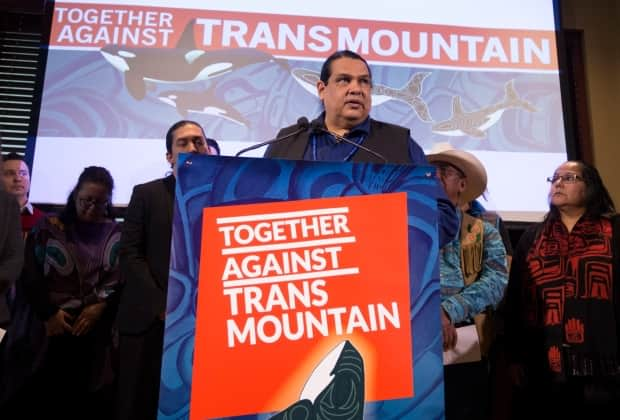Canada's pipeline regulator says it's taking a stand against systemic racism

Rueben George says he's not at all surprised that in an era of racial reckoning, Canada's top pipeline regulator is signalling it wants to confront the problem of systemic racism and its sometimes fraught relationship with First Nations.
He and others in Indigenous communities have long accused the Canada Energy Regulator and other energy-sector review bodies of prioritizing the interests of the fossil fuel industry over those of First Nations.
"Would they say those things if we didn't make them accountable? Probably not," said George, a member of the Tsleil-Waututh First Nation in British Columbia and manager of Sacred Trust, an organization launched by Tsleil-Waututh to fight the Trans Mountain pipeline expansion project.
"Because they are happily working within that system that was created and felt wasn't broken."
The Canada Energy Regulator (CER) now says it's committed to systemic change within the federal body, which reviews pipelines, cross-border power lines and some oil and gas activity in Canada's North.
The CER's senior leadership recently sat down for a virtual interview with CBC News. They said the regulator, formerly the National Energy Board, hasn't lived up to its obligations to First Nations, Métis and Inuit.
"From the organization's perspective, I acknowledge that systemic racism exists. We as an organization need to acknowledge that and to acknowledge our part in that," said Gitane De Silva, the regulator's CEO.
"The NEB has operated in a way that discounted Indigenous people, that saw them as an obstacle, that was adversarial," added Cassie Doyle, the CER's chairperson.
Federal government grapples with systemic racism
Federal bodies such as the RCMP have struggled to define systemic racism within their institutions. Former senator Murray Sinclair, who chaired the Truth and Reconciliation Commission on residential schools, has said that the existence of systemic racism in an organization doesn't mean that everybody within that organization is racist.
"Systemic racism is when the system itself is based upon and founded upon racist beliefs and philosophies and thinking and has put in place policies and practices that literally force even the non-racists to act in a racist way," Sinclair told the Globe and Mail in June.
The CER says it is working to recruit and retain a more diverse workforce and is training staff to better navigate tricky situations — such as pipeline crews stumbling upon Indigenous artifacts.
Some have said the CER has struggled in the past to react appropriately when engaging with Indigenous cultural ceremonies and prayer.

George said he remembers when members of the Tsleil-Waututh First Nation were given less than an hour to explain their nation's history and laws during an NEB hearing. One of the Tsleil-Waututh speakers began singing a traditional song — which turned into an awkward moment for the adjudicators, he said.
"One by one, all the Tsleil-Waututh people in the room, probably about 30 of us, stood up and joined him," George said. "[The NEB staff] didn't know what to do ... [whether] to stand up and to honour it. They didn't know what to do."
The Trans Mountain turning point
The Trans Mountain pipeline hearings may have been a pivot point for the regulator and the Canadian government. In 2018, the Federal Court scolded both over the pipeline's flawed approval process.
Although the ruling didn't address systemic racism, the court upbraided the Canadian government over its Crown consultations with First Nations.
"Some of the failures in the past on Crown consultation, failures, as dictated by the court — I think that's what gave the government the sort of impetus to say, 'Hey, we've got to do something really different,'" Doyle said.
The judicial smackdown partly prompted the renewal of Canada's environmental assessment legislation and, consequently, the transition of the National Energy Board into the Canada Energy Regulator in 2019.
'Industry kind of captured the NEB'
The new regulator now has an explicit mandate to advance reconciliation with First Nations, Métis and Inuit and to implement the United Nations Declaration on the Rights of Indigenous Peoples.
For the CER, it also means it's legally required to embed an Indigenous Advisory Committee high within its governance structure. The new committee's interim chair, Tyrone McNeil, said the committee is covering "new ground."
"I see this as a really deep, active form of reconciliation," said McNeil, a Stó:lō member from British Columbia. "Industry kind of captured the NEB. That's clearly not allowed here."
The committee is less than a year old and only finalized its goals and mandate this month. While its advice isn't binding on the regulator or on project rulings, the CER promised in a news release that it "will have tangible impacts in the day-to-day operations."
The committee's recommendations, the CER said, also could change its approach to "compliance and oversight activities" and "the implementation of the United Nations Declaration on the Rights of Indigenous Peoples within the CER's mandate."
The Canadian Association of Petroleum Producers (CAPP) has applauded the new committee, but in a statement, it pointed to the billions of dollars in energy-sector contracts that have gone to Indigenous-owned businesses.
"The oil and natural gas industry has made great progress in developing positive relationships with Indigenous communities and advancing opportunities for reconciliation, including business partnerships that generate economic, social and environmental benefits," said Shannon Joseph, vice-president of government relations and Indigenous affairs at CAPP.

A Vancouver based environmental lawyer said the CER and its arm's-length adjudicative panel should adopt whenever possible a collaborative approach with Indigenous nations and communities. Otherwise, said Eugene Kung, the CER's commitment to change will be empty.
"I certainly think there's a risk that it becomes hollow or performative," said Kung, a lawyer with West Coast Environmental Law. "There's lots of space to have collaborative, co-operative decision-making, which is going to result in the end in more robust decisions, less conflict and less legal challenges down the road."

